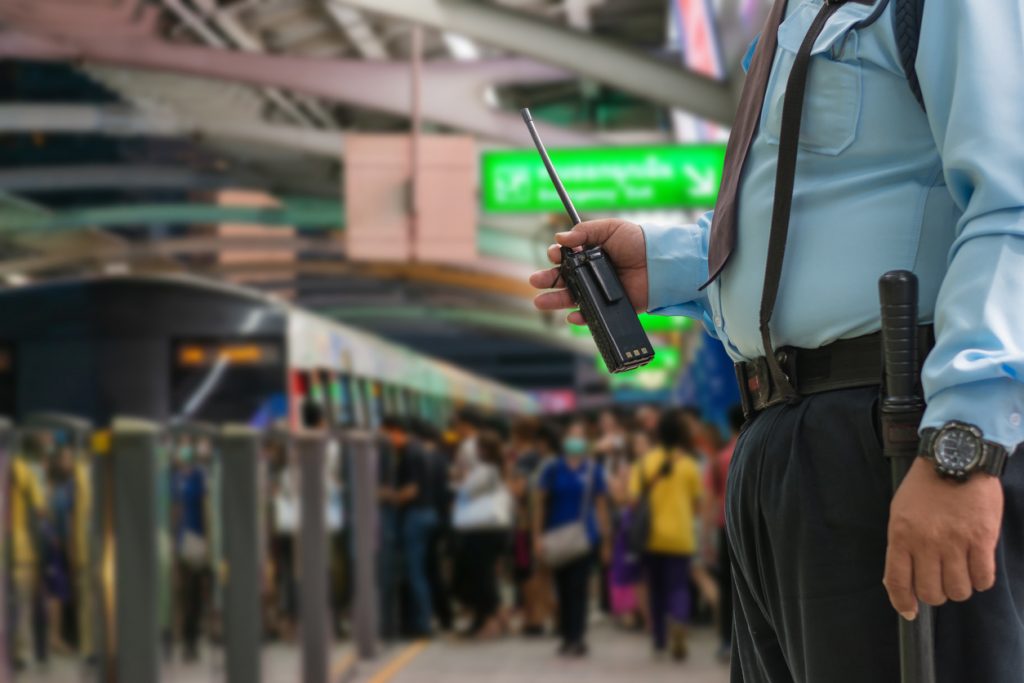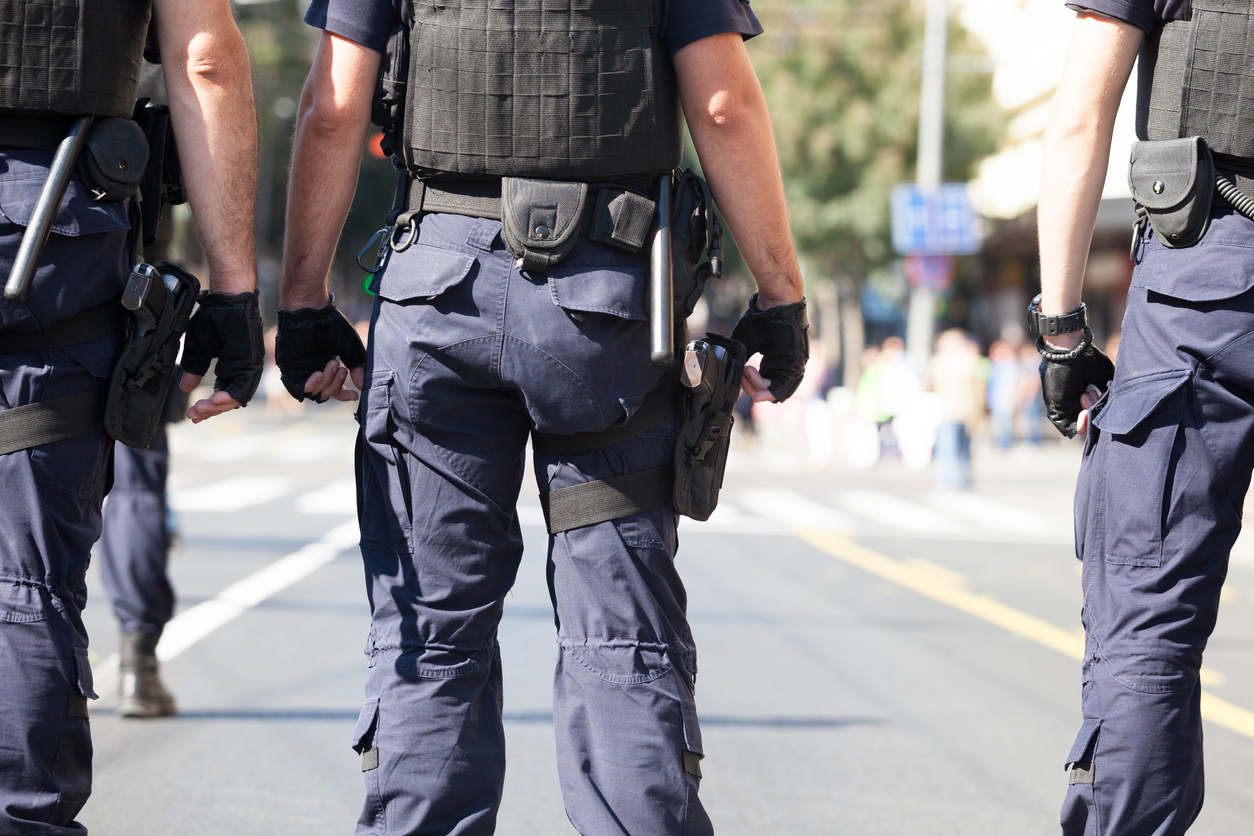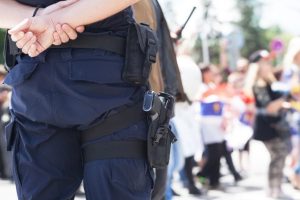Many people use the terms “security guards” and “security officers” interchangeably. They mistakenly believe that the two titles mean the same thing. While there is a little bit of variance between the two definitions depending on what state you live in, for industry insiders and professionals, each role has its own specific duties.
If you need personal security services for either your business or your family, it pays to know the difference. Let’s review each role in order to help you determine the security professional that’s right for your situation. After all, an informed client is a happy client.
What Is a Security Guard?
A security guard is a colloquial term that people typically use to describe all security professionals. To the public at large, anyone that wears a uniform and carries a set of handcuffs, who doesn’t work for the police department, is a security guard. There are, however, subtle differences between the two roles.
Generally speaking, a security guard works under a security officer. You can view the two roles as a hierarchical chain of command. Security guards also tend to be front line security professionals responsible for more of the lay work whereas security officers handle the big picture tasks.
A security guard is most often a stationary position, hence the title of “guard.” They are responsible for guarding a specific spot or location. If a security guard does have to be mobile they will most likely have a tight route or well-defined area of patrol along a commercial or residential property that they are limited to. This route is their primary sphere of influence.
A security guard’s primary role is to be proactive in the prevention of theft, disturbances, vandalism, and other criminal behavior. A security guard’s presence itself acts as a deterrent. By simply patrolling, or maintaining a conspicuous presence at their post or guard house, they prevent potential issues from becoming a reality.
A common public misconception is that security guards are not allowed to carry a weapon, only items like pepper spray or possibly handcuffs, whereas a security officer is allowed to carry a gun or other lethal weapon. This, however, is not true. The laws and requirements for armed security professionals differ on a state-by-state basis.
Generally speaking, in order to become a security guard, there is no unified national licensing requirement, nor is there any previous experience necessary. While requirements for accreditation or licensure are dependent on each individual state, all a potential security guard needs is a high school education and company-specific training courses.
When Do You Need a Security Guard?

Security guards are ideal for situations that call for limited mobility and a need for the security professional to serve as a proactive deterrent for criminal or disruptive behavior. You might find a security guard serving in the following settings:
- Mall or shopping center
- Patrolling a gated community
- Museum or public entertainment venue
- Factory or other industrial manufacturing sites
- Utility site
- Closed construction site
- Anywhere that a minor security presence can increase safety
What Are Security Officers?
A security officer, by comparison, is usually considered to be above a security guard in terms of responsibility, training, and chain of command.
In direct contrast to a security guard, a security officer is much more mobile. They are expected to provide oversight to the other security personnel out in the field, as well as actively patrolling potentially dangerous or high-needs areas. This brings with it an added level of both risk and liability. Therefore, security officers are usually better compensated in proportion to the risk involved.
A large component of the security officer’s role involves managing the other security guards. That means performing active checks on guard posts and patrol routes, but it also means an increased amount of paperwork and administrative duties.
A security officer is typically considered a field agent. Their movement and role is more dynamic in nature. They might not patrol a set route, but instead are responsible for the entire property or assignment location. Their on-site movements will be far less restricted than a security guard, and they will act as less of a deterrent and more as emergency personnel. While a security professional’s equipment doesn’t necessarily indicate whether or not they are a guard or an officer, due to the responsibilities and nature of their role, most security officers carry some sort of weapon for emergency situations.
To become a security officer typically requires a background in either law enforcement or the military. Oftentimes, a security officer will be either a retired or off-duty officer, or have served in the military at some point.
In regards to direct licensure, requirements differ by state, but a security officer usually requires some form of additional credential. Many times, the state does not make a differentiation between the terms “security guard” and “security officers”, leaving accreditation for security professionals as a gray area on the national level.
What Situations Call for Security Officers?
The role of a security officer is more dynamic than that of a security guard. It is also more administrative. As a result, security officers are often found on the same kind of job sites as security guards, but they are needed in different types of situations than their front line counterparts.
Some examples of situations that might call for a security officer are:
- Making rounds between security guard check points
- Doing field checks and patrols
- Responding to emergency situations
- Conflict resolution
- Performing administrative tasks in the office
Professional Services Through Security Pros
What level of security does your family, business, or event need? There are pros and cons to hiring a security guard or going for a trained security officer. A security guard can help you deter:
- Theft
- Vandalism
- Disruptive behavior
- Minor criminal activity
Learn More About the difference Between “Security Guards and “Security Officers”
A security officer with additional training and police background can offer a more robust set of services such as emergency interventions, conflict resolution, and increased safety training.
Understanding the difference between the two types of security professionals can help you decide what level of security is right for you. To speak with an armed security professional or to get a free quote, call Security Pros today.




















